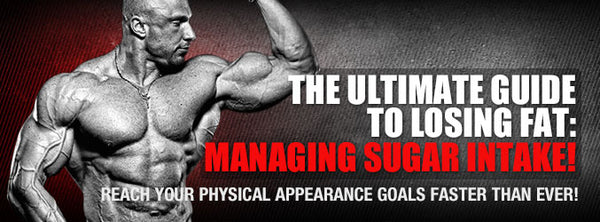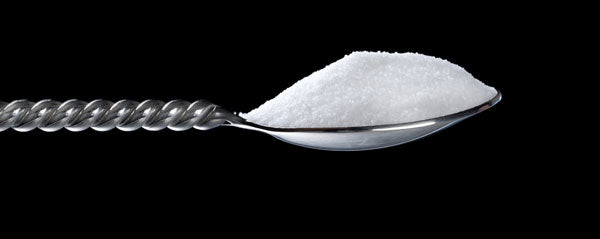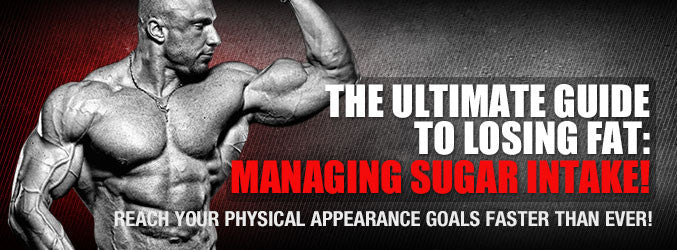
Sugar. It’s everywhere we look, and it just has that nasty habit of making everything taste so darn good. It can be good, it can be bad. Nobody has a problem with the sugar in an apple, but when it shows up in double-layer chocolate cake, suddenly we have a problem on our hands! Let’s dig in to some of the most commonly asked questions regarding sugar intake, and learn how managing sugar intake and making better food choices can help us to reach our fitness performance and physical appearance goals faster than ever!
Why is sugar considered bad?
Sugar CAN be bad. Many studies, taken over decades, have shown the negative impacts of high sugar consumption upon the body of both athletes AND the sedentary. Increased likelihood of cancer, heart disease and obesity are often associated with very high sugar consumption. Cans of soda, candy bars, donuts… these things bring both calories and grams of sugar. Even worse is that the calories are considered “empty”. In other words, their effect on satiety is minimal. Your body cannot use that many sugar calories efficiently for energy purposes. Sugar is not processed efficiently by the body, creating a scenario where fatty-acid production skyrockets, leading to greater fat storage by the body. You don’t see too many skinny people over 25 chugging Coca-Cola! The toxicity of sugar is another issue which warrants discussion. Many believe high doses of sugar can very negatively affect the systems of the body.
Can sugar be good?
Sugar gives us energy. And to the contrary of the “sugar is evil” mantra we’ve heard many times, there are a number of studies which show the body can use sugar efficiently for energy purposes. However, limitations exist which should be affixed to any such assertion. High calorie lifestyles, coupled with periods of low activity, tend to skew studies. Those with reasonably active people eating reasonable to higher amounts of sugar, see little variance in their overall health and fitness performance abilities and levels. The higher the sugar intake goes, however, the more ill-health effects are noticed.
Does it matter if I’m an athlete?
As with many food choices, those who expend a great deal of energy are given much more leeway than those who sit in a cubicle for 8 hours a day and follow that up with 4 hours of watching television. Athletes are incredible specimens with higher metabolic rates, as well as greater levels of muscle mass – all of which helps to burn more of sugar’s calories. At the same time, however, there are some health aspects which should be recognized, no matter how active one may be. High levels of sugar, as well as the other processed additives in sugar-rich foods, can be very bad for the body. Being an athlete helps, but it doesn’t forgive sugar intake at extremely high levels.
How does science play into it?
Sugar consumption is an issue of interest to many people, both inside and outside of the fitness realm. Low sugar consumption (not none, but not a lot either) has been shown to have little to no effect on the body in terms of inflammation, insulin, thyroid, cholesterol, blood lipids, blood glucose, or blood pressure. In order words, you CAN enjoy some sugar without affecting any of these arenas so important to overall health. Fat loss is even very similar between the two groups – dispelling the myth that the body cannot use sugars for energy. The key factor is HOW MUCH sugar is being consumed, compared with how much activity the body is being forced to complete. Large amounts of sugar, consumed by an inactive video gamer, will lead to health problems and a spare tire around the waist. On the other hand, a small amount of sugar, consumed by an athlete facing 30 minutes of weight training and 45 minutes on the treadmill each day, can be a great source of added energy to be used for activity. In other words, one should keep the sugar intake moderate while staying active in order to avoid any negative health ramifications.

What is the bottom line?
Nutritional trends tend to come and go. The 1970s and 1980s were marred with “fat is evil” indoctrination. Today, we know fat plays a very important role in our overall health and in terms of the fat loss process. Gluten, dairy, and protein have all gone from king to coming under fire. Research proves and disproves.
Sugar’s role – and the task of identifying it as good or bad - is not exactly a simple one. Sugar can help you lose fat. Sugar can give you energy to train. Sugar arrives in apples and oranges, fruits that come with fiber and many other micronutrients and vitamins.
Keeping BALANCE is probably the most important factor to consider when making an evaluation on sugar. You want some, to function and from fruits, but a lot will definitely set you back when it comes to reaching your goals.


